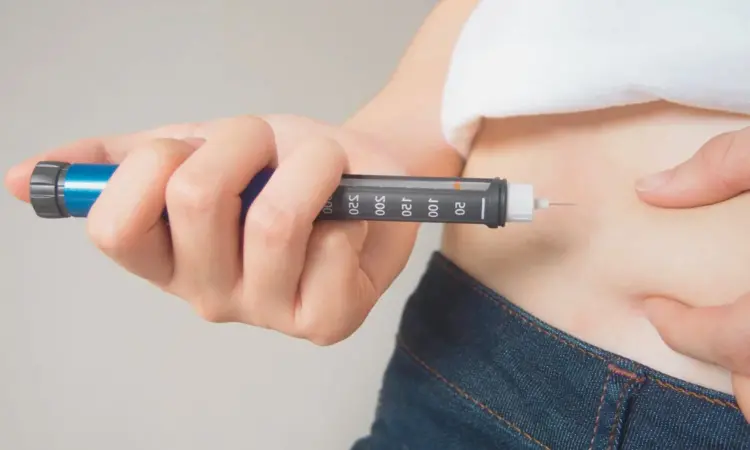- Home
- Medical news & Guidelines
- Anesthesiology
- Cardiology and CTVS
- Critical Care
- Dentistry
- Dermatology
- Diabetes and Endocrinology
- ENT
- Gastroenterology
- Medicine
- Nephrology
- Neurology
- Obstretics-Gynaecology
- Oncology
- Ophthalmology
- Orthopaedics
- Pediatrics-Neonatology
- Psychiatry
- Pulmonology
- Radiology
- Surgery
- Urology
- Laboratory Medicine
- Diet
- Nursing
- Paramedical
- Physiotherapy
- Health news
- Fact Check
- Bone Health Fact Check
- Brain Health Fact Check
- Cancer Related Fact Check
- Child Care Fact Check
- Dental and oral health fact check
- Diabetes and metabolic health fact check
- Diet and Nutrition Fact Check
- Eye and ENT Care Fact Check
- Fitness fact check
- Gut health fact check
- Heart health fact check
- Kidney health fact check
- Medical education fact check
- Men's health fact check
- Respiratory fact check
- Skin and hair care fact check
- Vaccine and Immunization fact check
- Women's health fact check
- AYUSH
- State News
- Andaman and Nicobar Islands
- Andhra Pradesh
- Arunachal Pradesh
- Assam
- Bihar
- Chandigarh
- Chattisgarh
- Dadra and Nagar Haveli
- Daman and Diu
- Delhi
- Goa
- Gujarat
- Haryana
- Himachal Pradesh
- Jammu & Kashmir
- Jharkhand
- Karnataka
- Kerala
- Ladakh
- Lakshadweep
- Madhya Pradesh
- Maharashtra
- Manipur
- Meghalaya
- Mizoram
- Nagaland
- Odisha
- Puducherry
- Punjab
- Rajasthan
- Sikkim
- Tamil Nadu
- Telangana
- Tripura
- Uttar Pradesh
- Uttrakhand
- West Bengal
- Medical Education
- Industry
Tirzepatide Lowers albuminuria among Type 2 Diabetes Patients: Study

A post hoc analysis of trial data published in Diabetes Care found that adults with type 2 diabetes receiving tirzepatide experienced greater reductions in the urine albumin-to-creatinine ratio (UACR) compared to those on a placebo or other therapies. The effect was even more pronounced in patients with chronic kidney disease. This study was conducted by Ellen M. and fellow researchers.
This post hoc analysis used data from the combined SURPASS-1–5 trials, including baseline UACR ≥30 mg/g subgroups. A mixed model for repeated measures was used to compare on-treatment changes in UACR from baseline through to the last treatment visit. Study identifier was entered into the model as a covariate to account for variability between trials.
Key Findings
• Tirzepatide 5 mg, 10 mg, and 15 mg doses substantially decreased UACR compared with all combined comparators.
• 5 mg dose: -19.3% (95% CI -25.5, -12.5)
• 10 mg dose: -22.0% (95% CI -28.1, -15.3)
• 15 mg dose: -26.3% (95% CI -32.0, -20.0)
• Decrease in UACR was seen across all comparators, including placebo, active treatments, and insulin-based treatments.
• In patients with baseline UACR vastly above or equal to 30 mg/g, there was a notable improvement, suggesting significant benefit in chronic albuminuric patients.
• Mediation analysis indicated that weight loss caused by tirzepatide mediated about 50% of the reduction in albuminuria.
• The eGFR during the course of the study never varied more than 6.57 points between the comparator and the tirzepatide combination at week 40/42.
The study authors found that tirzepatide demonstrated reduction in UACR, validating its role in kidney protection in patients with type 2 diabetes. These findings are encouraging of the evaluation of tirzepatide in the treatment of diabetes, especially in those with pre-existing renal abnormality.
Reference:
Dr Riya Dave has completed dentistry from Gujarat University in 2022. She is a dentist and accomplished medical and scientific writer known for her commitment to bridging the gap between clinical expertise and accessible healthcare information. She has been actively involved in writing blogs related to health and wellness.
Dr Kamal Kant Kohli-MBBS, DTCD- a chest specialist with more than 30 years of practice and a flair for writing clinical articles, Dr Kamal Kant Kohli joined Medical Dialogues as a Chief Editor of Medical News. Besides writing articles, as an editor, he proofreads and verifies all the medical content published on Medical Dialogues including those coming from journals, studies,medical conferences,guidelines etc. Email: drkohli@medicaldialogues.in. Contact no. 011-43720751


